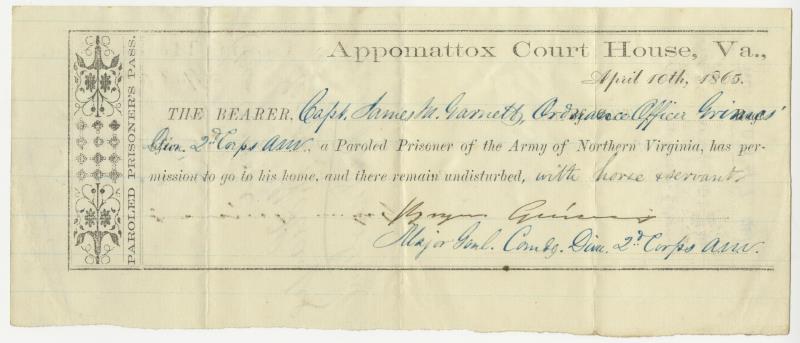Today I was reminded that on April 9, 1865, Confederate General Robert E. Lee surrendered to Union General Ulysses Grant, effectively ending the Civil War. I have always read about this event, and several years ago was finally able to visit the site and see for myself. It’s a fascinating part of American history.
The ceremony (such as it was) took place in the home of Wilmer McLean. The irony is that at the beginning of the war, McLean lived in Manassas, Virginia, very near the site of the war’s first major battle. From some accounts I had gotten the impression that the First Battle of Bull Run (Union designation) or First Manassas (Confederate name) had actually occurred on his farm, and that he immediately moved away. When I got the chance to see the battlefield for myself, my first question for the park ranger was “Where is the McLean house?” I was told it was in the town of Manassas, and that for a time Wilmer McLean stayed in that area to sell supplies to the Confederate Army. (The Wikipedia entry does say his house was used as General Beauregard’s headquarters and was hit by a cannonball, but confirms he was in no hurry to leave; he didn’t move until the spring of 1863, https://en.wikipedia.org/wiki/Wilmer_McLean.)
One detail the history books never mention is the work that must happen to support an event like this. General Grant’s surrender terms were very generous — he paroled the Confederate soldiers and allowed them to keep their firearms and horses. But that meant paperwork. A portable printing press was brought in to print thousands of parole forms, essential since the war was still raging in other parts of the country. Pictured is an example from the website http://edu.lva.virginia.gov/dbva/items/show/148. That reminded me of a lot of the “grunt work” I had to do in the Air Force.
Every account of the surrender I’ve ever read comments on the contrasting appearance of the two men. General Lee wore a new uniform with all the trimmings. General Grant came in splattered in mud and wearing a private’s coat. The significance? Grant had no time to prepare because Lee effectively called the meeting, so the appearance differences can’t be considered important.
Lastly, I think there’s a lesson here for today. Grant realized the nation had a huge task ahead — bringing the pieces back together. He did what he could at the time — providing rations for the Confederates and prohibiting any victory celebrations by the Union Army.
It’s a shame such sentiments are in short supply today.
